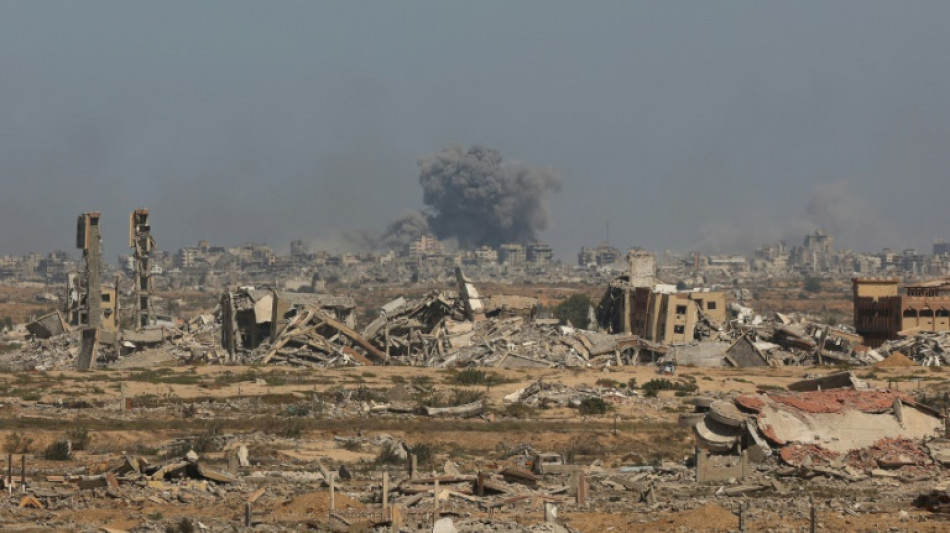

Hamas says still needs time to study Trump's Gaza plan
A Hamas official told AFP on Friday that the group still needed time to study a plan put forward by US President Donald Trump to end nearly two years of devastating war in Gaza.
The proposal, backed by Israeli Prime Minister Benjamin Netanyahu, calls for a ceasefire, the release of hostages within 72 hours, Hamas's disarmament and a gradual Israeli withdrawal from Gaza.
That would be followed by a post-war transitional authority headed by Trump himself.
"Hamas is still continuing consultations regarding Trump's plan... and has informed mediators that the consultations are ongoing and need some time," the official said on condition of anonymity because they were not authorised to speak publicly on the matter.
Trump on Tuesday gave Hamas an ultimatum of "three or four days" to accept his plan, which has been welcomed by world powers, including Arab and Muslim nations.
Mohammad Nazzal, a member of Hamas's political bureau, said in a statement Friday that the "plan has points of concern, and we will announce our position on it soon."
"We are in contact with mediators and with Arab and Islamic parties, and we are serious about reaching understandings," he added.
On the ground on Friday, the Palestinian territory's civil defence agency -- a rescue force operating under Hamas authority -- reported heavy air bombardment and artillery shelling on Gaza City.
- 'Catastrophic' -
The Israeli military has for weeks been waging an air and ground offensive on the territory's largest urban centre, from where hundreds of thousands have been forced to flee.
Media restrictions in Gaza and difficulties accessing swathes of the territory mean AFP cannot independently verify details or casualty figures provided by the Israeli military or the civil defence.
Adnan Abu Hasna, a media adviser for the UN Palestinian relief agency UNRWA, described the situation in Gaza as "catastrophic," with Palestinians forced into repeated rounds of displacement and where "access to food and water remains limited."
As the war nears the two-year mark and the death toll and destruction continues to rise, protesters around the world have in recent days railed at Israel's interception of a flotilla carrying pro-Palestinian activists and aid for Gaza.
On Friday, the organisers of the Global Sumud Flotilla said its last remaining boat had been intercepted some 40 nautical miles from Gaza.
As Hamas mulled Trump's peace plan this week, a Palestinian source close to the group's leadership told AFP on Wednesday that the Islamist movement "wants to amend some of the clauses such as the one on disarmament and the expulsion of Hamas and faction cadres."
Hamas leaders also want "international guarantees for a full Israeli withdrawal from the Gaza Strip" and guarantees that no assassinations attempts will be made inside or outside the territory, the source added.
Another source familiar with the negotiations told AFP that the group was split over Trump's plan.
Structurally, the group's leadership is divided between officials based in the Gaza Strip and those abroad, particularly in Qatar -- which has acted as a key mediator with Egypt and the United States throughout the war.
Much of the Hamas's leadership has been wiped out in Israeli attacks throughout the war.
- 'Two opinions' in Hamas -
The source close to the group's leadership said that "two opinions exist within Hamas".
"The first supports unconditional approval, as the priority is a ceasefire under Trump's guarantees, with mediators ensuring Israel implements the plan," the source told AFP.
"The second has serious reservations regarding key clauses, rejecting disarmament and the expulsion of any Palestinian from Gaza. They favour conditional approval with clarifications reflecting Hamas's and the resistance factions' demands," the source added.
Hugh Lovatt, a senior policy fellow at the European Council on Foreign Relations, said Qatar would pressure Hamas to provide a positive, but "ultimately it's not just about convincing Hamas leadership in Doha, but also the leadership in Gaza, as well as Hamas members and fighters in Gaza," he added.
"Additionally, Hamas must then be able to convince other factions in Gaza," he added.
The war was triggered by Hamas's October 7, 2023 attack on Israel, which resulted in the deaths of 1,219 people, mostly civilians, according to an AFP tally of Israeli official figures.
Israel's retaliatory offensive has devastated killed at least 66,225 Palestinians, according to health ministry figures in the Hamas-run territory that the United Nations considers reliable.
Their data does not distinguish between civilians and combatants, but indicates that more than half of the dead are women and children.
T.Peeters--JdB



